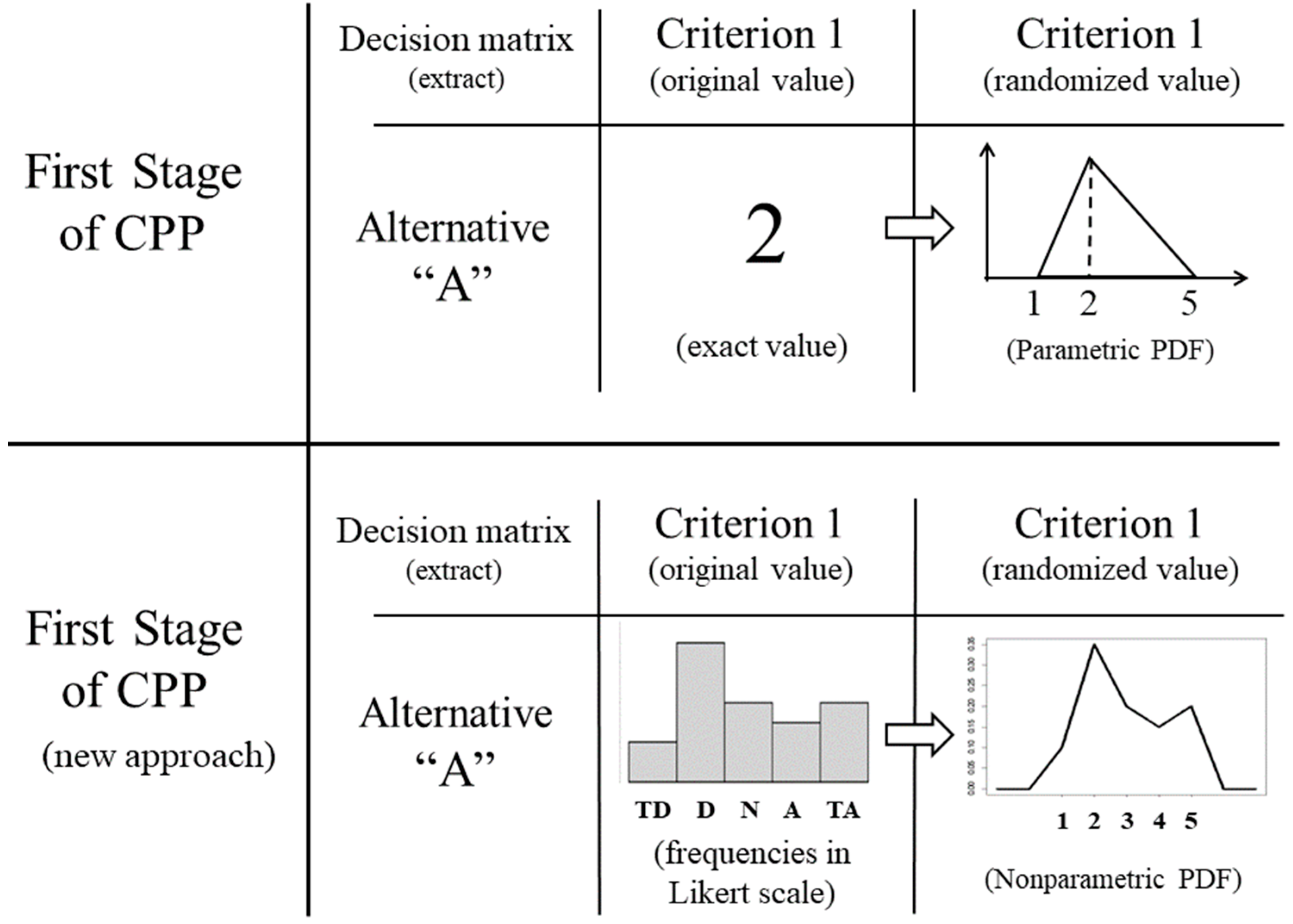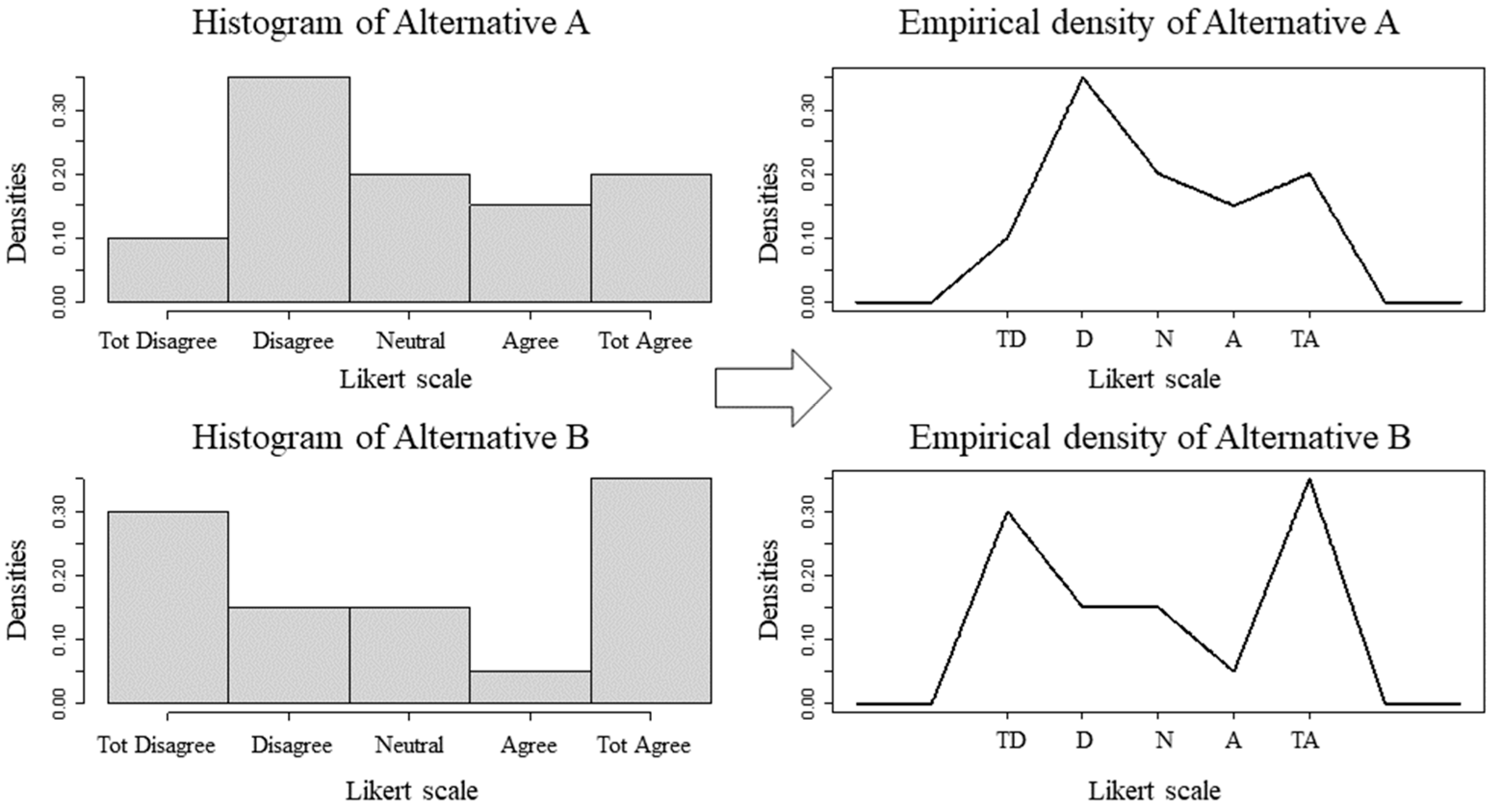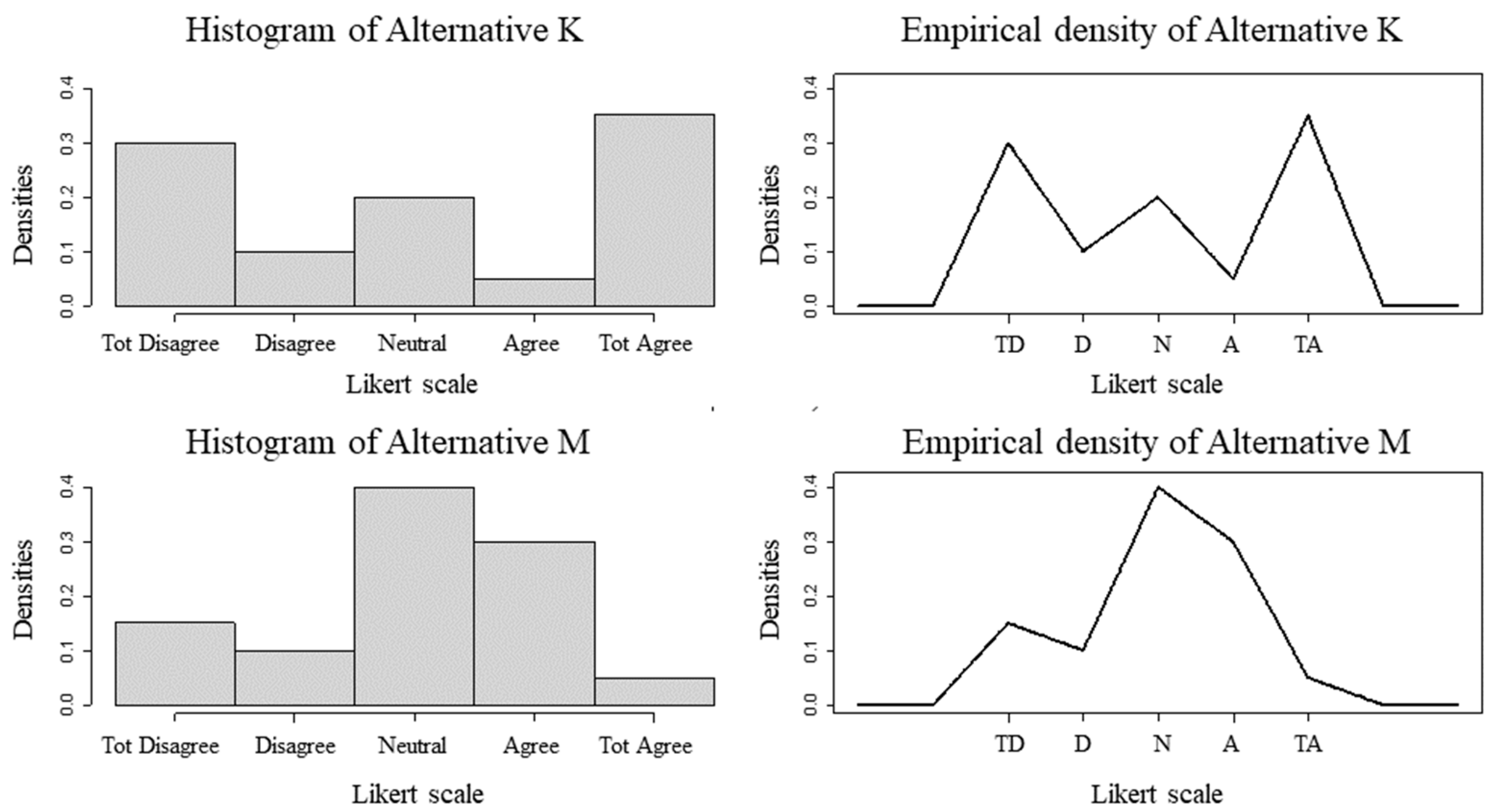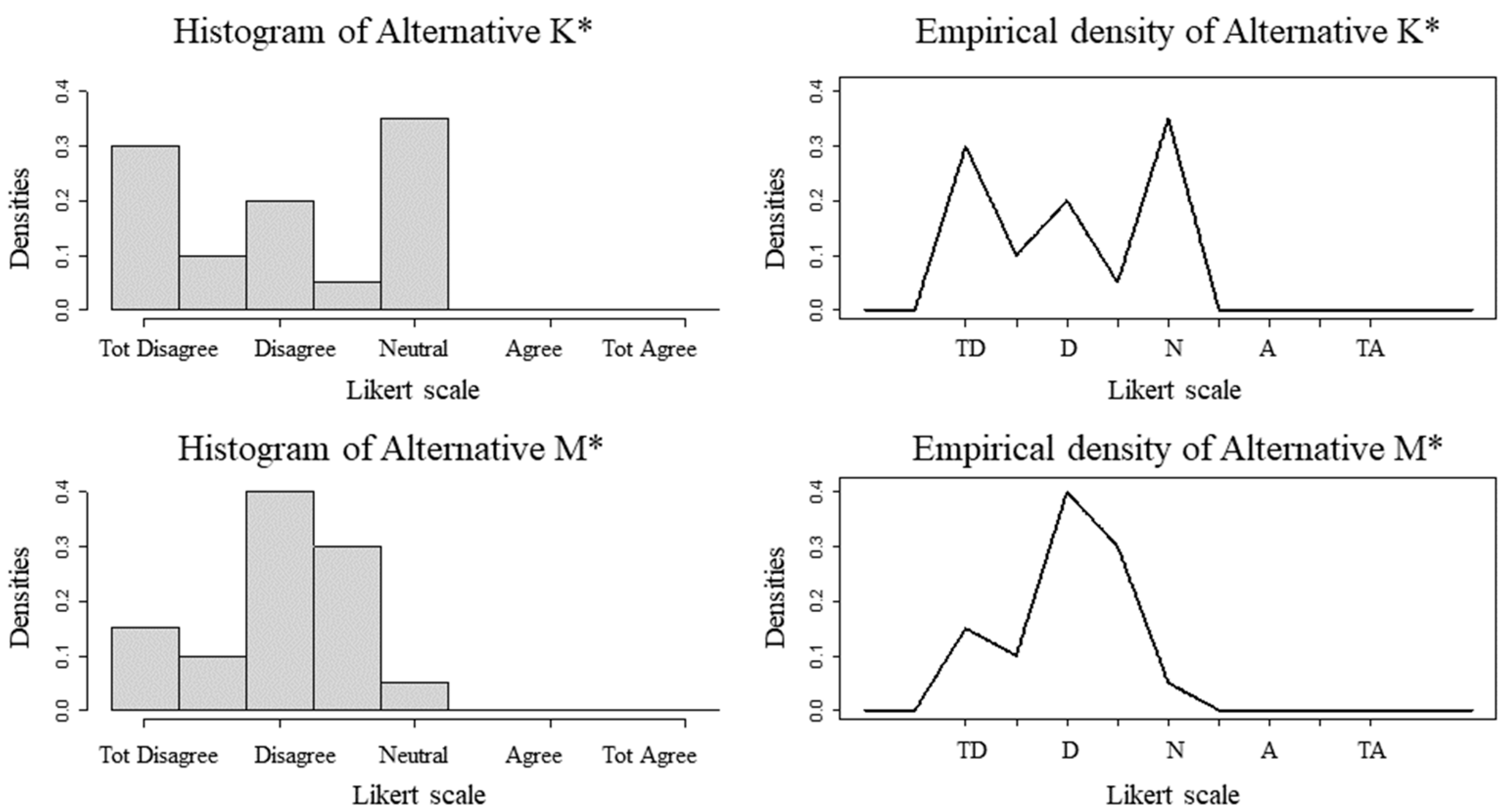Submitted:
24 May 2023
Posted:
25 May 2023
You are already at the latest version
Abstract
Keywords:
1. Introduction
2. Materials and Methods
3. Applications
3.1. Dataset with the Same Means and Medians
3.2. CPP Sensitivity to Likert Scale Cardinality
3.3. Unified Health System (SUS)
4. Conclusions
Author Contributions
Funding
Conflicts of Interest
Appendix A
References
- Sant’Anna, AP. Probabilistic Composition of Preferences, Theory and Applications. 1st ed. New York: Springer, 2015.
- Likert, R. A technique for the measurement of attitudes. Arch Psychol 1932, 22, 5–55. [Google Scholar]
- Williams, MN. Levels of measurement and statistical analyses. Meta-Psychology 2021, 5, 1–14. [Google Scholar] [CrossRef]
- Bishop PA, Herron RL. Use and misuse of the Likert item responses and other ordinal measures. Int J Exerc Sci 2015, 8, 297. [Google Scholar]
- Tanujaya B, Prahmana RCI, Mumu J. Likert scale in social sciences research: Problems and difficulties. FWU J Soc Sci 2022, 16, 89–101. [Google Scholar]
- Hair JF, Black WC, Babin BJ, et al. Multivariate data analysis. Cengage Learning. 8th ed. London: Cengage Learning EMEA, 2018.
- Kuzon W, Urbanchek M, McCabe S. The seven deadly sins of statistical analysis. Ann Plast Surg 1996, 37, 265–272. [Google Scholar] [CrossRef]
- Wu H, Leung S-O. Can Likert scales be treated as interval scales?—A Simulation study. J Soc Serv Res 2017, 43, 527–532. [Google Scholar] [CrossRef]
- Awang Z, Afthanorhan A, Mamat M. The Likert scale analysis using parametric based Structural Equation Modeling (SEM). Comput Methods Soc Sci 2016, 4, 13–21. [Google Scholar]
- Baran, T. Comparison of parametric and non-parametric methods to analyse the data gathered by a likert-type scale. In: Handbook of Research on Applied Data Science and Artificial Intelligence in Business and Industry. IGI Global, 2021, pp. 414–430.
- Norman, G. Likert scales, levels of measurement and the “laws” of statistics. Adv Heal Sci Educ 2010, 15, 625–632. [Google Scholar] [CrossRef] [PubMed]
- Harpe, SE. How to analyze Likert and other rating scale data. Curr Pharm Teach Learn 2015, 7, 836–850. [Google Scholar] [CrossRef]
- Thomas, MA. Mathematization, Not Measurement: A Critique of Stevens’ Scales of Measurement. J Methods Meas Soc Sci 2019, 10, 76–94. [Google Scholar] [CrossRef]
- Stevens, SS. On the theory of scales of measurement. Science (80- ) 1946, 103, 677–680. [Google Scholar] [CrossRef] [PubMed]
- Mircioiu C, Atkinson J. A comparison of parametric and non-parametric methods applied to a Likert scale. Pharmacy 2017, 5, 1–12. [Google Scholar]
- Pornel JB, Saldaña GA. Four common misuses of the Likert scale. Philipp J Soc Sci Humanit 2013, 18, 12–19. [Google Scholar]
- Jamieson, S. Likert scales: How to (ab) use them? Med Educ 2004, 38, 1217–1218. [Google Scholar] [CrossRef] [PubMed]
- Allen IE, Seaman CA. Likert scales and data analyses. Qual Prog 2007, 40, 64–65. [Google Scholar]
- Sullivan GM, Artino Jr AR. Analyzing and interpreting data from Likert-type scales. J Grad Med Educ 2013, 5, 541–542. [Google Scholar] [CrossRef]
- Sant’Anna AP, Sant’Anna LAFP. Randomization as a stage in criteria combining. In: International Conference on Industrial Engineering and Operations Management - VII ICIEOM. Salvador, 2001, pp. 248–256.
- Wandresen RR, Netto SP, Koehler HS, et al. Nonparametric method: Kernel density estimation applied to forestry data. Floresta 2019, 49, 561–570. [Google Scholar] [CrossRef]
- Jiang T, Li D. Approximation of rectangular beta-Laguerre ensembles and large deviations. J Theor Probab 2015, 28, 804–847. [Google Scholar] [CrossRef]
- Chalabi Y, Scott DJ, Würtz D. The generalized lambda distribution as an alternative to model financial returns. Inst Für Theor Phys Univ Auckland, Zürich, Auckland, available www Rmetrics Org/Sites/Default/Files/Glambda Pdf or www rmetrics org/sites/default/files/2009-01-glambdaDist pdf.
- Zhou Z, Azam SS, Brinton C, et al. Efficient Federated Domain Translation. In: International Conference on Learning Representations. 2023, pp. 1–31.
- Pouillot R, Delignette-Muller ML. Evaluating variability and uncertainty separately in microbial quantitative risk assessment using two R packages. Int J Food Microbiol 2010, 142, 330–340. [Google Scholar] [CrossRef] [PubMed]
- Gavião LO, Sant’Anna AP, Lima GBA, et al. Evaluation of soccer players under the Moneyball concept. J Sports Sci 2020, 38, 1221–1247. [Google Scholar] [CrossRef]
- Garcia PA de A, Sant’Anna AP. Vendor and logistics provider selection in the construction sector: a Probabilistic Preferences Composition approach. Pesqui Operacional 2015, 35, 363–375. [Google Scholar] [CrossRef]
- Sant’Anna AP, Meza LA, Ribeiro ROA. Probabilistic composition in quality management in the retail trade sector. Int J Qual Reliab Manag 2014, 31, 718–736. [Google Scholar] [CrossRef]
- Gaviao LO, SantAnna AP, Lima GBA, et al. Selecting a Cargo Aircraft for Humanitarian and Disaster Relief Operations by Multicriteria Decision Aid Methods. IEEE Trans Eng Manag 2020, 67, 631–640. [Google Scholar] [CrossRef]
- Sant’Anna AP, Faria F, Costa HG. Aplicação da Composição Probabilística e do método das K-Médias à classificação de municípios quanto à oferta de creches. Cad do IME-Série Estatística 2013, 34, 17. [Google Scholar]
- Gavião LO, Silva RF da, Sant’Anna AP, et al. Ordenação de Municípios por Potencial de Contaminação de Águas com Fármacos Oncológicos por Composição Probabilística de Preferências [Powerpoint slides in Portuguese]. In: XLVIII Simpósio Brasileiro de Pesquisa Operacional. Vitória, 2016, p. 12.
- Garcia PA de A, Garcia VS, Saldanha PLC, et al. Combined use of composition of probabilistic preferences and entropy weighting for failure mode prioritization. In: European Safety and Reliability Conference - ESREL 2015. Zurique: CRC Press, 2015, pp. 381–386.
- Gavião LO, Meza LA, Lima GBA, et al. Improving discrimination in efficiency analysis of bioethanol processes. J Clean Prod 2017, 168, 1525–1532. [Google Scholar] [CrossRef]
- Gavião LO, Sant´Anna AP, Lima GBA, et al. Probabilistic preferences of Likert scale data by empirical distributions. Version 2.0. 2023; 1.
- Gavião LO, Sant’Anna AP, Lima GBA, et al. CPP: Composition of Probabilistic Preferences. R package version 0.1.0. 2022; 1–24.
- Gavião LO, Sant’Anna AP, Lima GBA, et al. Selecting distribution centers in disaster management by Network Analysis and Composition of Probabilistic Preferences. In: Amorim AMTT, Barbastefano RG, Scavarda LF, et al. (eds) Industrial Engineering and Operations Management. Rio de Janeiro-RJ: PUC-RJ, 2020, pp. 1–11.




| Scale | Basic Empirical Operations | Permissible Statistics |
|---|---|---|
| Nominal | Determination of equality | Number of cases Mode Contingency correlation |
| Ordinal | Determination of greater or less | Median Percentiles |
| Interval | Determination of equality of intervals or differences | Mean Standard deviation Product-moment correlation |
| Ratio | Determination of equality of ratios | Coefficient of variation |
| Algorithm: “Empirical probabilities of preference on Likert scales” |
|---|
| 1. Description: ranking alternatives evaluated on a criterion |
| 2. Variables > values – vector with numerical sequence of Likert scale options > freqs – Likert scale option frequency matrix: - matrix rows: problem alternatives - matrix columns: frequencies of Likert scale options |
| 3. Commands > open the R software console > install the R software "mc2d" library > load the database "values” and “freqs” > run the " PMax.Emp.Likert " function, for “benefit” type criteria > run the " PMin.Emp.Likert " function, for “cost” type criteria > rank alternatives in the criteria |
| 4. End |
| Alternative | PMAx | PMin |
|---|---|---|
| A | 0.08981332 | 0.09327040 |
| B | 0.15662032 | 0.16098827 |
| C | 0.10803823 | 0.10993096 |
| D | 0.10599313 | 0.10154487 |
| E | 0.06747378 | 0.06140966 |
| F | 0.07062573 | 0.07502867 |
| G | 0.05176373 | 0.04871787 |
| H | 0.10671008 | 0.10557457 |
| I | 0.12501971 | 0.12782754 |
| J | 0.11794092 | 0.11570593 |
| Scales | Alternative | Median | Mean | Mode | PMax | PMin |
|---|---|---|---|---|---|---|
| 5 points | K | 3 | 3.05 | 5 | 0.4667357 | 0.5332673 |
| M | 3 | 3 | 3 | 0.5332673 | 0.4667357 | |
| 9 points | K* | 3 | 3.05 | 5 | 0.5637278 | 0.4362749 |
| M* | 3 | 3 | 3 | 0.4362749 | 0.5637278 |
| Hospital | Likert scale (% of evaluations) |
PMax | Rank PMax | Rank Ebserh | Ebserh result (%) | ||||
|---|---|---|---|---|---|---|---|---|---|
| 1 | 2 | 3 | 4 | 5 | |||||
| CHC-UFPR | 8 | 19 | 5 | 52 | 16 | 3,09E-02 | 11 | 21 | 66,9 |
| CH-UFC | 6 | 7 | 6 | 57 | 25 | 4,61E-02 | 3 | 5 | 82,2 |
| CHU-UFPA | 4 | 17 | 14 | 52 | 13 | 2,57E-02 | 19 | 24 | 64,3 |
| HC-UFG | 7 | 16 | 10 | 52 | 14 | 2,79E-02 | 15 | 22 | 66,3 |
| HC-UFMG | 4 | 11 | 5 | 61 | 19 | 3,66E-02 | 7 | 8 | 79,9 |
| HC-UFPE | 5 | 19 | 9 | 58 | 9 | 2,09E-02 | 27 | 20 | 67,3 |
| HC-UFTM | 8 | 11 | 11 | 56 | 14 | 2,85E-02 | 14 | 18 | 70,1 |
| HC-UFU | 8 | 17 | 11 | 53 | 11 | 2,34E-02 | 21 | 25 | 63,6 |
| HDT-UFT | 0 | 12 | 6 | 82 | 0 | 1,21E-02 | 35 | 10 | 77,8 |
| HE-UFPEL | 22 | 31 | 3 | 25 | 19 | 3,37E-02 | 8 | 34 | 44,4 |
| HUAB-UFRN | 6 | 8 | 12 | 54 | 21 | 3,86E-02 | 5 | 15 | 72,2 |
| HUAC-UFCG | 0 | 12 | 5 | 67 | 17 | 3,33E-02 | 10 | 6 | 81,4 |
| HUAP-UFF | 10 | 25 | 7 | 50 | 9 | 1,99E-02 | 30 | 29 | 57,9 |
| HUB-UnB | 4 | 21 | 8 | 53 | 14 | 2,73E-02 | 16 | 23 | 65,3 |
| HUCAM-UFES | 3 | 9 | 6 | 59 | 23 | 4,27E-02 | 4 | 7 | 81,4 |
| HU-FURG | 13 | 19 | 9 | 44 | 16 | 3,00E-02 | 12 | 28 | 59,4 |
| HUGD-UFGD | 17 | 28 | 10 | 38 | 7 | 1,59E-02 | 33 | 35 | 44,1 |
| HUGG-Unirio | 8 | 23 | 15 | 48 | 8 | 1,78E-02 | 31 | 31 | 55 |
| HUGV-UFAM | 11 | 24 | 9 | 51 | 5 | 1,47E-02 | 34 | 32 | 54,3 |
| HUJB-UFCG | 0 | 11 | 0 | 78 | 11 | 2,65E-02 | 17 | 1 | 88,9 |
| HUJM-UFMT | 7 | 11 | 4 | 69 | 9 | 2,30E-02 | 22 | 9 | 78 |
| HUL-UFS | 19 | 38 | 10 | 29 | 5 | 1,15E-02 | 36 | 36 | 31,8 |
| HULW-UFPB | 5 | 17 | 5 | 58 | 15 | 2,99E-02 | 13 | 12 | 72,7 |
| HUMAP-UFMS | 7 | 17 | 3 | 64 | 9 | 2,22E-02 | 23 | 13 | 72,5 |
| HUOL-UFRN | 6 | 16 | 10 | 55 | 13 | 2,65E-02 | 18 | 19 | 67,8 |
| HUPAA-UFAL | 6 | 15 | 6 | 65 | 9 | 2,20E-02 | 24 | 16 | 71,4 |
| HUPES-UFBA | 15 | 22 | 6 | 51 | 7 | 1,77E-02 | 32 | 30 | 57 |
| HUSM-UFSM | 2 | 9 | 1 | 62 | 26 | 4,82E-02 | 2 | 2 | 86,3 |
| HU-UFJF | 3 | 9 | 7 | 64 | 17 | 3,37E-02 | 9 | 11 | 77,3 |
| HU-UFMA | 14 | 23 | 8 | 45 | 10 | 2,13E-02 | 26 | 33 | 54,1 |
| HU-UFPI | 3 | 7 | 8 | 62 | 20 | 3,82E-02 | 6 | 4 | 82,5 |
| HU-UFS | 1 | 17 | 8 | 64 | 9 | 2,17E-02 | 25 | 14 | 72,4 |
| HU-UFSC | 7 | 22 | 7 | 56 | 9 | 2,06E-02 | 29 | 26 | 63 |
| HU-UFSCar | 17 | 0 | 0 | 50 | 33 | 6,52E-02 | 1 | 3 | 83,3 |
| HU-UNIVASF | 2 | 22 | 13 | 50 | 13 | 2,50E-02 | 20 | 27 | 60,4 |
| MCO-UFBA | 8 | 21 | 0 | 63 | 8 | 2,07E-02 | 28 | 17 | 70,8 |
Disclaimer/Publisher’s Note: The statements, opinions and data contained in all publications are solely those of the individual author(s) and contributor(s) and not of MDPI and/or the editor(s). MDPI and/or the editor(s) disclaim responsibility for any injury to people or property resulting from any ideas, methods, instructions or products referred to in the content. |
© 2024 by the authors. Licensee MDPI, Basel, Switzerland. This article is an open access article distributed under the terms and conditions of the Creative Commons Attribution (CC BY) license (https://creativecommons.org/licenses/by/4.0/).





